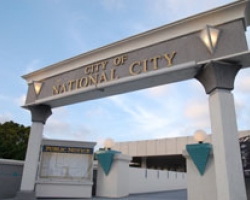Filipino-American and Asian Pacific Islanders organizers, primarily led by Attorney Audie de Castro and business owner Ditas Yamane, held a Dec. 4 rally at Market on 8th encouraging residents to demand National City adopt district-based voting as a way to increase representation.
Adopting that approach would mean the city of about 61,000 residents would change its voting approach from at-large elections, in which every resident can vote for anyone running for city council, to a district-based system in which the city would be broken up into voting blocks based on geographic lines.
Addressing roughly 75 attendees who sat on the outside patio of the new public food market, de Castro explained he had already sent a letter to City Council demanding they “comply with the law” and adhere to the 2001 California Voting Rights act that prohibits the use of any election system which “ impairs the ability of a protected class to elect candidates of its choice or its ability to influence the outcome of an election”.
De Castro presented three arguments to scattered applause: that the relatively small size of National City should not preclude districting because smaller cities have already adopted the approach, that the city benefits economically from Filipino investors regardless of where they live, and that current elected officials, none of whom are Filipino, should not have a say in how that community is represented.
“This is about having influence,” de Castro said.
Three current city council members have a combined 53 years of governing the city, he said, and none of them are Filipino.
“So they say a few words in Tagalog and say thank you but is that enough?” de Castro asked before going on to suggest city leaders publicly suggest they support the Filipino community but privately pit Filipinos against each other.
De Castro maintains he is merely pushing for the city to adopt a plan of intention to implement district-based voting at this point and does not expect a system-overhaul to happen overnight, but he has also been clear: he will bring a lawsuit to the city if it does not appear to be moving toward districts by Dec. 23.
First steps toward that goal would require the city to create an Independent Redistricting Council and schedule three public hearings, at a minimum.
Momentum toward district-based voting has increased over the past 20 years in California, in part because some municipalities have found themselves embroiled in lawsuits designed to force cities to convert from an at-large to a district system.
Mary Soriano, who described herself as a concerned Filipino citizen, tried to offer background on a Kern County legal case in which residents sued for districts but de Castro quickly took the microphone from her.
She later said it is important for the community to “not act emotionally but address the situation from a legal point of view” and consider how other cities have approached achieving better representation.
Several organizers brandished cutouts of National City Mayor Alejandra Sotelo-Solis and former mayor and current City Council member Ron Morrison with the challenging question ‘Friend or Foe?’ in bold letters.
However, city council member Jose Rodriguez attended the event with his family and said he was there simply to listen, but generally believes every resident should have representation. Part of the reason for districts is so elected officials do not all come from the same neighborhood, he said, especially as density increases in some areas.
“A few years back, we had four council members who lived within a mile of each other, with three of them on Manchester. Currently, not one of us lives on the west side of Highland. I care about the entire city, my kids go to Kimball Elementary on the west side, but there isn’t a representative who actually lives there and one point of districting is to ensure every single citizen gets representation,” Rodriguez said.
Racial Justice Coalition of San Diego representative Yusef Miller, who also attended the event said he believes “something’s definitely happening” and even if the group is not immediately successful, they are building “future residual power”.
“The energy behind it— with faith and confidence they will be successful if they keep it up,” Miller said.
City Manager Brad Raulston did not respond to a request for comment.












